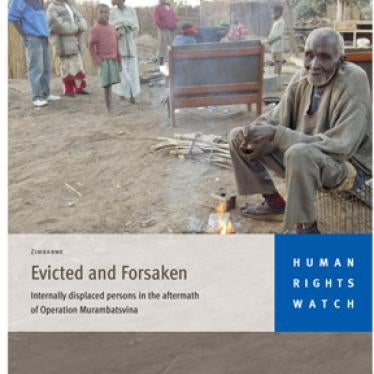The Zimbabwean government is refusing to protect and assist hundreds of thousands of people displaced by its campaign of forced evictions, Human Rights Watch said in a report released today. At the same time, Zimbabwe is deliberately obstructing efforts by international humanitarian agencies to provide assistance and protection to the displaced.
The 61-page report, “Evicted and Forsaken: Internally Displaced Persons in the Aftermath of Operation Murambatsvina,” documents the government’s denial of assistance and protection to people internally displaced as a result of Operation Murambatsvina (“Clear the Filth”), which began in May. The report also examines the role of international agencies, and in particular the United Nations country team, in addressing the humanitarian crisis in Zimbabwe.
“The Zimbabwean government has created a humanitarian crisis in which hundreds of thousands of people are now living without food, water or shelter,” said Peter Takirambudde, Africa director at Human Rights Watch. “Not only have the Zimbabwean authorities refused to acknowledge the crisis, they have abandoned the men, women and children they forcibly evicted from their homes.”
Today, hundreds of thousands of displaced Zimbabweans are living outdoors in disused fields or in the bush, in rudimentary shelters made from the debris of destroyed houses, or are squeezed into tiny rooms with family members who have agreed to shelter them. The government has done nothing to provide them with food, water, sanitation and health services.
President Robert Mugabe’s government has also failed to address the desperate situation of vulnerable groups that were particularly hit hard by the evictions. These groups include widows, orphans, households headed by women or children, and the chronically ill or elderly. Some children have developed malnutrition due to lack of food, while others have fallen ill with pneumonia after months of sleeping out in the open. Following their forced eviction, hundreds of people living with HIV/AIDS are no longer able to access life-saving treatment such as anti-retroviral medications or remedies for opportunistic infections.
The Zimbabwean authorities have engaged in a concerted effort to coerce those displaced by the evictions to leave the cities and move to the rural areas. In areas across the country, the national police have threatened, harassed or beaten the internally displaced, forcing them to relocate to rural areas where many have no homes or family and where social service provisions and economic opportunities are minimal. In addition, the government has tried to force relocation by denying assistance to those who choose to stay in the urban areas, and has used food packages as an incentive to compel families to move out of the cities.
In blatant disregard of its international obligations, the Zimbabwean government has denied international humanitarian agencies access to the majority of the internally displaced. The government has also deliberately obstructed the provision of international assistance and protection to these vulnerable people.
“Zimbabwe’s blocking of humanitarian assistance for its displaced population is unconscionable,” Takirambudde said. “Such actions threaten the very survival of these people.”
The report emphasizes that the obligation to protect and assist the displaced lies first with the Zimbabwean government. But Human Rights Watch also found flaws within the U.N.-led humanitarian assistance program in Zimbabwe. The problems include the U.N. country team’s failure to assess and monitor the situation of the internally displaced, and to devise a realistic response strategy that would take existing challenges into account. The team also has not paid sufficient attention to protection concerns in the planning and implementation of its programs.
U.N. agencies involved in humanitarian response in Zimbabwe have been reluctant to confront the government over its blatant disregard of the human rights of the displaced and to protest the continued obstruction of humanitarian assistance, claiming that quiet representation would be more effective for achieving its operations.
“While the U.N. cannot be held responsible for the Zimbabwean government’s recalcitrance, it does bear a responsibility to protect and assist the hundreds of thousands of displaced people whose fundamental rights are being violated,” Takirambudde said.
Human Rights Watch called on the Zimbabwean government to permit national and international humanitarian agencies full and unhindered access to these internally displaced persons and other victims of Operation Murambatsvina. The government should immediately provide the displaced persons with assistance and protection—including food, water, shelter, sanitation and medical services—or ensure them access to these services. Humanitarian agencies should give priority to the needs of vulnerable groups such as widows, children, the elderly and the chronically ill.
The report called on the U.N. country team to work in full compliance with its mandate to assist and protect the displaced and to advocate for the human rights of all those displaced by Operation Murambatsvina.







